China's Future Shock
China has taken a enormous leap from rice paddies to space exploration, practically overnight. Already the world's most mobile-phoning people, soon the Chinese will be buying the most cars, burning the most fuel. Yet, even as innumerable cities of 10 million install broadband and brash skylines, over a billion people are still submerged in those paddies. But for those in the thick of it, though, the world has seen no faster jolt in history, no greater Future Shock.
By Ron Gluckman /around China
WITH HIS BAGGY SWEATSHIRT and expensive mountain bike, Zhang Xiao-Guang might be a typical 28-year-old in practically any city. Until you sit down for a meal and hear him relate the kind of rags-to-riches tale you only hear in two places in the world anymore.
At a story screening session in Hollywood. Or in China.
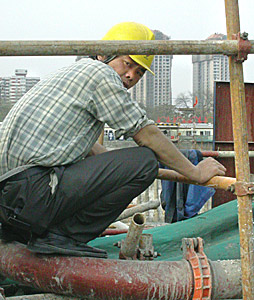 Soon, Zhang will
join Beijing's
brigade of suits, part of the parade of salary men chasing the double-digit growth in
the capital. Ten years ago, though, this scared, wiry teen had more in common with
a different demographic group: the enormous, 250-million strong migrant population. Meaning, he lived like any
homeless person, only while working his way through university.
Soon, Zhang will
join Beijing's
brigade of suits, part of the parade of salary men chasing the double-digit growth in
the capital. Ten years ago, though, this scared, wiry teen had more in common with
a different demographic group: the enormous, 250-million strong migrant population. Meaning, he lived like any
homeless person, only while working his way through university.
He hauled water by bucket to his single room in an enormous concrete housing bunker in Beijing. Unsanitary, unheated. "I was living like a migrant worker," he recalls. "There was no water, no shower, no toilet. I had to go outside. The worst was winter. It was freezing."
Zhang burned coal in his unventilated room, a practice banned by Beijing authorities both because of the human and environmental risk, but a law largely ignored and gladly broken by Zhang whenever he had the means to. Otherwise, he lingered in his university library, not so much to soak up knowledge as a few precious hours of warmth.
Zhang had already battled his way to Beijing, like millions more from China's vast hinterland. He had daringly also defied the government, rejecting a university posting in Shijiazhuang, capital of Hebei Province, where he was raised.
Few from the farms in his hometown ever escaped, but Zhang had grander dreams. One view of Shijiazhuang, and he was set. "It was dirty, ugly," he recalls. "I wanted something different. I didn't know what exactly, since I was young. Freedom, I guess."
He earned that in Beijing, but at a price, sleeping on floors until he found a place at one of the many private business colleges springing up to serve ambitious youth like Zhang.
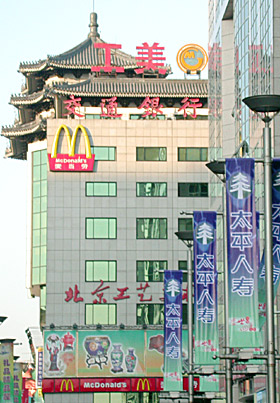 Even when he moved into his own room, there was little sleep. He worked nights at MacDonald's,
earning under $1 an hour. Every buck eased the burden on his parents back home.
Even when he moved into his own room, there was little sleep. He worked nights at MacDonald's,
earning under $1 an hour. Every buck eased the burden on his parents back home.
But what a difference a decade makes in the mainland. In 10 years, Zhang has moved from flipping burgers to management training. His salary at Siemens' Management Institute in Beijing, will be more than the state railway pays teachers like his parents in a full year. Such is the speed of change in China in less than a generation.
"Things in China," he says, "are moving like light-speed."
Faster still for Zhang and contemporaries like Yu Jin-Yan, 24, who was raised in a town outside Changchun, capital of northeastern Jilin Province. Her father drives a bus for a construction crew, at least he does when there is seasonal work in a dirt-poor region bordering Russia and North Korea.
"If I had stayed, maybe I could have been a secretary," says Yu, whose English degree had little value in a place with few western businesses, or westerners. Worst of all, she adds: "There would have been no chance for my development."
So she joined the throngs relocating to big cities like Beijing, where secretaries can earn five times the Changchun monthly salary of $75. More important, she says, was the potential for a better, fuller life.
Yu worked odd jobs, looking for a lucky break. That came when she met an Australian entrepreneur used to spotting opportunities, such as this inexperienced but plucky young job seeker, who hired her on the spot. Currently, she's an office assistant. "But she's a fast learner," says boss Alan Reid. "The way she is going, look out."
Yu wants to work her way into project management. And she has big dreams, of buying a car and a house. Such dreams are commonplace in China these days. But, a decade ago, there was no real estate market; all housing was assigned by the state. Five years back, there wasn't a single private car in her hometown of Yongji.
 Hence, such ambitions, to say nothing of mobility, represent revolutionary
aspects of life to an equally novel new class in China - the Lucky Generation,
coming of age in an era of unprecedented opportunity and choice. Not just in
terms of consumer goods, but every facet of life once dominated by a state that
dictated where one lived, worked and studied.
Hence, such ambitions, to say nothing of mobility, represent revolutionary
aspects of life to an equally novel new class in China - the Lucky Generation,
coming of age in an era of unprecedented opportunity and choice. Not just in
terms of consumer goods, but every facet of life once dominated by a state that
dictated where one lived, worked and studied.
The exhilarating options sometimes make the future seem as bright as all the department stores opening along widened boulevards filled with new cars. Yet options can be daunting to a population that remains largely set in the past.
Emancipation from the old state system brings excitement, but anxiety; call it Future Shock. "That's a good name for it," Zhang agrees. "Future Shock. That's China sometimes."
The term might seemed dated, coined by Alvin Toffler in his 1970s book, "Future Shock." Yet the premise, that tomorrow dawns at an ever-faster - and shocking - pace, never seemed so spot-on as in today's China, a nation with one foot rooted in a feudal age while the other kick steps into the 21st Century, with its own space program, cities of towering skyscrapers and the world's largest network of mobile phones.
All this denotes a genuine Great Leap Forward, unlike absurd propaganda campaigns of the past, with true quantum gains in everything from infrastructure and information technology to food, fashion, lifestyle, all in a single, frenzied generation.
"That's the thing about China now," says Pei Rong Ming, 37, a software expert for Oracle in Beijing. "It's like we're going through a new generation every five years."
Pei says it with a smile, because life is unquestionably better in all ways for his family of three. They have a Fu Kan (Rich and Healthy) car, and small, but comfortable flat in the new suburb of Wanjing (slang for Overlooking Beijing), subsidized by the university where his wife, Xiong Wei, works.
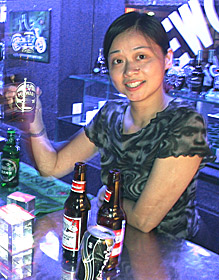 Both
earn good salaries, and Pei has had an unusual career, including a fling in
Beijing's dot-com boom. He's also been overseas, training in Germany in the
mid-1990s while working for SAP, the Walldorf software firm.
Both
earn good salaries, and Pei has had an unusual career, including a fling in
Beijing's dot-com boom. He's also been overseas, training in Germany in the
mid-1990s while working for SAP, the Walldorf software firm.
This makes them part of a privileged class in Beijing, where incomes and aspirations, until recently, lagged behind Shanghai and Shenzhen. While other cities modernized, Beijing seemed stuck in its stodgy role as national capital, until the award of the 2008 Olympics ignited an infrastructure and redevelopment spending spree that is remaking the capital.
Still, 36-year-old Xiong says life is filled with anxiety. "The big questions are all about tomorrow. Things today are good, but what about the future? We think of this all the time, and so do all of our colleagues. That is why everyone works so hard. It's uncertainty.
"Even if we can live comfortably now, what about tomorrow?"
A generation ago, she knows, things were immeasurably tougher. Both her parents were engineers, but together earned 100 yuan (about $12.50 nowadays) monthly, which had to support the family of four, plus her grandmother.
The oldest child, her earliest memory is of shopping. "I only had a few cents, and I had to think about how to feed the whole family," she recalls sadly. "But there wasn't much anyway."
Now, everything exists in excess: computers, cars, fancy clothes. Concerns, too. Over entirely new concepts like pension planning and life insurance. In the past, work units arranged it all - housing, food, hospital - complete life planning from birth to burial.
"Resources are what we think of all the time," she sighs, as she brushes the hair of daughter Pei Shu Lin. "The planning is endless."
Take a pressing family concern: space. The university-supplied flat is cheap, but only has two bedrooms. Both parents regularly bring home work, a common trait in a China renowned until recently for its enormous lack of initiative. Now, it's more like the People's Republic of Competition.
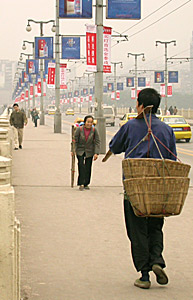 At the University of
International Business and Economics, Xiong teaches marketing, a field so new,
she was the first instructor and was largely self-taught, using the internet to
communicate with colleagues overseas.
At the University of
International Business and Economics, Xiong teaches marketing, a field so new,
she was the first instructor and was largely self-taught, using the internet to
communicate with colleagues overseas.
"Now, we have 10 different courses at my university alone," she says. "Everything in China expands like that."
The family hopes to do the same, moving to an apartment with enough bedrooms and office space to go around. But the property market gives them pause. And provides a good example of how, with the new opportunities come unexpected anxieties.
Beijing is booming like other gateway cities, where real estate sales have risen at rates nearly four times the economy's 7-8 percent annual growth. Construction activity and prices have also skyrocketed.
"We're looking at the market constantly," says, Xiong. Guessing trends in a such a maverick market is impossible. And forget turning to family members for advice about home buying or mortgages. Older generations never heard of such things.
The reality is, despite a refreshing air of renaissance in Beijing and other cities across New China, most rules are still being written. This becomes clear when Pei and Xiong discuss schooling for six-year-old Shu Lin.
Moving house means changing schools, but they have no clue how that is done. Shu Lin attends a quality school, attended by children of college employees in the neighborhood.
"In China, everyone can go to school," Pei says. "But some schools are better. To find a good school can be difficult, and we have no idea of the cost." Then, the software solutions specialist scratches his head, baffled about the procedures. Computers come with manuals; not New China.
Some assume the impact of all this upheaval has to weigh heaviest upon the elderly, suddenly overwhelmed by modern influences after a lifetime of isolation. Not so, insist the younger generation. The onus, they say, is on them to keep up-to-date in a nation essentially going through an Industrial Revolution simultaneously with its emergence into the Computer Age.
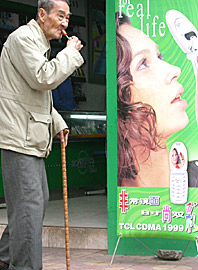 "It's
like this," explains Xu Qiong Ying, 29, a Shanghai reporter who recently
moved to Beijing. "My grandmother never had a car, but now my uncle does,
so she just thinks that's great, and she has him drive her everywhere.
"It's
like this," explains Xu Qiong Ying, 29, a Shanghai reporter who recently
moved to Beijing. "My grandmother never had a car, but now my uncle does,
so she just thinks that's great, and she has him drive her everywhere.
"She has no idea what kind of car it is, or what is involved in having a car, anymore than she understands the internet. So much of change is like that to older people.
"They just look at whatever is new and say, OK. For us, all the changes have meaning, and are complicated. They are real developments that we have to deal with."
In modern China, that means learning on the fly, by whatever means. Increasingly - and despite Beijing's efforts to censor it - the internet is a major source of information.
China has over 60 million internet users, 70 percent under the age of 30, according to China Internet Network Information Centre. Yet access was practically nil a decade ago.
Wang Yi Jin, 28, a Beijing human resources worker, puts things in perspective when describing her student days at Qinghua University, Beijing's top institution, often called China's MIT. "It's the best science school in the country and it had only one computer lab when I was there," she says.
"When I graduated from college, I had no email, I didn't even know what the internet was. Information is the big change in China.
"In China, the media is in control of the government. With the internet, all of a sudden, we hear new voices, get different information," she explains.
"In China, it gives us a new view of the world." And of Chinese society. Wang describes how her own perspective changed after she worked for a German company and spent two years in Munich in the late 1990s.
A discussion of the death penalty provided a shock. Expressing her views, she suddenly realized she didn't have any of her own; she was reciting the Beijing position. "It made me realize, in China, you never doubt anything."
Going overseas alters that mind-set. While group travel is a fast-growing new trend, passports and visas are still tightly controlled in China. Yet the internet has no borders, offering a brave new wired world of enlightenment outside Beijing's control.
Hence, the scene one day last spring on Wangfujing Avenue, the main shopping street in Beijing. Nowhere in the capital, perhaps anywhere in the country, so defines China's modern ambitions, or its recent transformation.
A dozen years ago, the pedestrian-only boulevard was chaotic street markets and stone hovels. Now the smart shopping street boasts scores of boutiques and fashion-conscious customers in henna-tinted hair. Signs shout slogans of the Consumer Revolution: Gucci, Esprit, Nike, Rolex and Omega.
On one corner of this bustling shopping mecca, is the international cathedral of caffeine, Starbucks. Across the street, sits Saint Joseph's, a more traditional church, at least by Chinese standards.
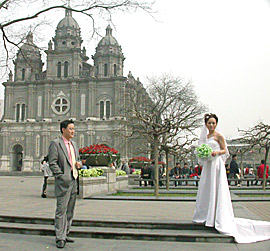 Built on a site where Italian
missionaries first held services 350 years ago, it was leveled by an earthquake
in 1720, and has repeatedly been rebuilt and razed. Shuttered in the Cultural
Revolution, it was restored a few years back by Beijing.
Built on a site where Italian
missionaries first held services 350 years ago, it was leveled by an earthquake
in 1720, and has repeatedly been rebuilt and razed. Shuttered in the Cultural
Revolution, it was restored a few years back by Beijing.
Now the surrounding square draws shoppers, sunbathers and skateboarders. Plus an odder new subculture: the wedding brigade. Up and down Wangfujing, window displays sport lacy western gowns. On weekends, long lines of wedding parties form at the church for photo sessions.
On the last Sunday in March, Wangfujing was the scene of even more radical activity. American forces had stormed Iraq, sparking street protests everywhere. Except in China, perhaps the only nation that opposed the war, but hadn't allowed its citizens to say so.
That was set to change this Sunday. Organizers detailed plans for a demonstration, but permits were refused. Organizers vowed to go on anyway. Hundreds turned out to see what would happen.
The show didn't last long. When anti-Bush banners were raised, secret police started making arrests. Watching was a crowd, including a Qinghua student who, despite his command of the sciences, admitted bafflement over this latest mystery of the Middle Kingdom.
"This is really dumb. The views of the protesters are available for all to see," he said, pulling out a pile of papers downloaded on the net. "Why can they say what they want on the internet, but not on Wangfujing?" he asked, not waiting for an answer.
Beijing was censoring its citizens for agreeing with the government position, he pointed out. "It makes China look stupid."
Free speech, it seems, is one shock that the founding grandfathers hope to keep in the future. And no wonder, considering the topography. Around the corner and down the block is Tiananmen Square, site of student protests that vilified Beijing around the globe and set back reform, some here believe, by at least a decade.
"That was a huge lost opportunity for youth," says Dong Jun, 36, a newscaster at Chinese Radio International (an English-language service that he likens to a mainland version of Voice of America).
Dong Jun thinks the government was itself shocked after Tiananmen into a shift in approach, focusing less on overall reform and more on economic growth designed to assuage all the angst with opportunities. The results have been growth rates leading the world for a decade, and jobs for millions of college graduates.
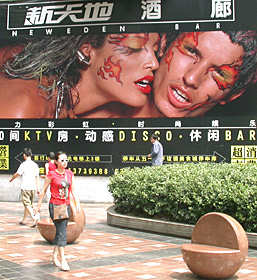 Yet, there has
been a price to pay, he feels. "People are much more materialistic,"
he says. "People my age and older were educated that life was a struggle.
Now, if you talk to kids, their top priority is to enjoy life.
Yet, there has
been a price to pay, he feels. "People are much more materialistic,"
he says. "People my age and older were educated that life was a struggle.
Now, if you talk to kids, their top priority is to enjoy life.
"When I was young, I was so eager to see China develop into a more open society. But now that it is so close, I'm not so passionate. I think we have added some good things, but lost other things. Like, when I was a kid, we caught fish and frogs in the little river by my house."
Not for his son, though. The river is gone. Anyway, he would rather eat Big Macs. "It's a battle all the time," says Dong. "We really have to persuade him to eat Chinese by promising to take him to MacDonald's or Kentucky Fried Chicken."
Materialism is a common complaint these days, from young as well as old. Still, you hear other voices and the hint of changes blowing in the wind from every direction.
Wang, the human resources worker, is a budding feminist bothered by the inequality of women not only in the workplace, but in marriage. Divorce, almost unheard of in the past, is soaring.
And China seems to be joining the New World Disorder, if gains in psychology studies are an indication. A decade ago, psychology graduates like Gong Wen were forever confused with fortune tellers. Early this year, 600 students competed for 80 places in the psychology department of the Beijing Normal University.
Such are the trends that China watchers are tapped into. But radio man Dong warns of an enormous X-factor: the migrant population. Beijing alone admits to four million of them, unregistered and unregulated, casual workers on construction sites, bar girls, beggars.
"People perceive that folk from the Chinese countryside as more traditional and conservative. But these migrants have been freed of the traditional constraints of life, of land," Dong says. "They are getting so free in big cities and we see the results, crime, violence, prostitution." Sex, drugs, maybe even rock 'n' roll.
Yet there is also great hope in the future generations. Xue Jing Jing calls herself Bobo, but not after those trendy types in Shangri-la, but after an American cartoon clown. She's 20 and studying international trade at Beijing Polytechnic University. By some measures, she's almost a complete composite of restless Chinese youth culture, at least in the cities.
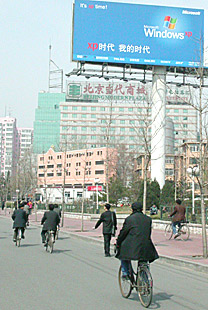 She's already worked as a
waitress, language tutor and travel agent. For a time, she played keyboards in a
punk band. "I try different jobs because I want to find out what I can do,
what I'm good at. People say life is short. I want to try lots of things."
She's already worked as a
waitress, language tutor and travel agent. For a time, she played keyboards in a
punk band. "I try different jobs because I want to find out what I can do,
what I'm good at. People say life is short. I want to try lots of things."
She concedes: "My way of thinking is different from a lot of people at the university. All they think about is studying, finishing their degree, getting a comfortable job, and a good salary. It's all so tedious."
Feeling estranged is perhaps the price of all this new freedom, say many at the frontlines of this changing society. Zhang, the management trainer bound for Siemens, says he finds so many of his contemporaries "materialistic, interested in cars, fashion status."
Admittedly, it's part of modernization, as Zhang himself realizes. Soon, he moves into a new flat, and what a shock: he's still sleeping on a floor, of his old office. "I just never got around to looking for a new apartment," he concedes sheepishly.
Still, it takes him back to his uncertain arrival in Beijing. "Sometimes," he says, "I think that was the best time. Everything was simple."
Then, he hops on his mountain bike and threads through the thickening traffic; another questioning, sometimes confused young mind. Like practically anywhere else in the world.
But like so much else in China these days, that's another shocking new reality.
Ron Gluckman is an American reporter based in Hong Kong, who roams around Asia for a number of publications, such as GEO, which commissioned this story for a special issue on China in the summer of 2003. Because of SARS, and the severe impact on tourism and advertising, the issue was slimmed down. This story was among several that never appeared in print, and is a www.gluckman.com exclusive.
To return to the opening page and index
push here
[right.htm]
